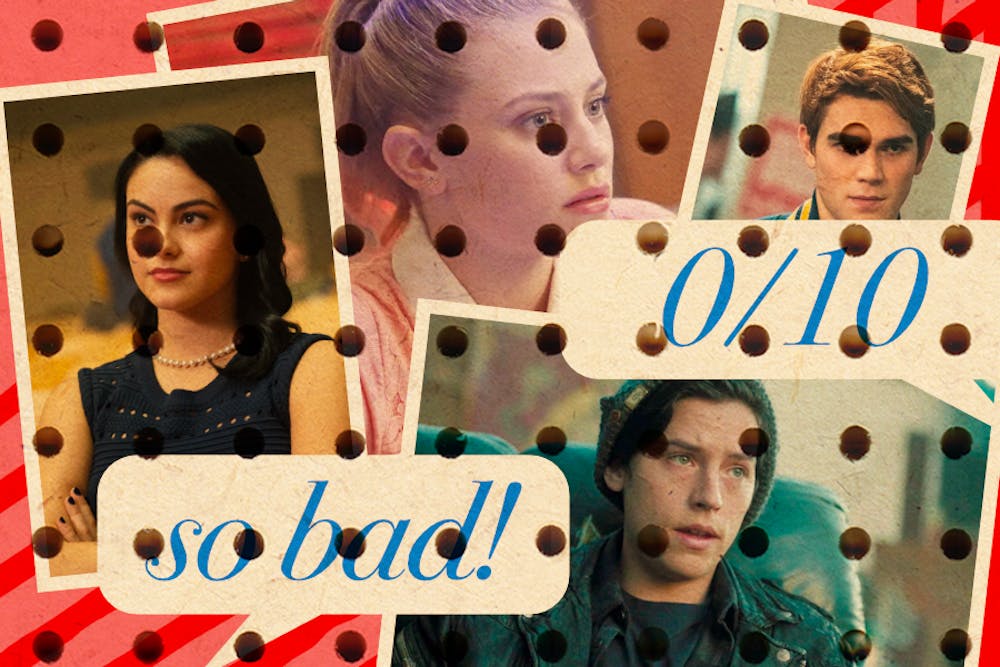There are many ways for an actor to advertise a show. Saying “I was a little bit relieved when I saw my character jumping out the window” is not one of them. Sam Witwer, who portrayed Mr. Chipping in Riverdale, is not the first cast member to convey more than a slight disdain for the teen drama.
The shock at Witwer’s comments is significantly alleviated should one watch even a single episode of the CW’s Riverdale. Bursting at the seams with content to critique, each episode is chock–full of far–fetched sub–plots, characters out of a psychedelic episode, and dialogue cringey enough to elicit empathy for the millionaire actors reciting it: Cheryl Blossom regularly dresses up and speaks to her brother Jason’s dead body. She must have the contact for an excellent embalmer, given that Jason died in season one but seems to be in great condition.
With season six coming out this month, all early signs point to another installment of absurdity. Embracing the supernatural, the trailer introduces Kiernan Shipka as Sabrina the Teenage Witch from the sister show The Chilling Adventures of Sabrina. With the first episode of the season titled "Welcome to Rivervale," creators promise viewers entry into “the place you’ll fear” during the five–episode event. A closer look at the show’s trajectory helps us assess exactly what we can expect from the upcoming season.
It’s become clear that the Riverdale writers have a penchant for the ridiculous, and scorn reality as a limitation to their wildly crafted universe. This has the potential to be entertaining—however, overwhelmingly terrible execution impedes enjoyment. Riverdale’s seasonal "musical" episodes can be praised for their experimentation, if the experiment is exploring whether forty minutes of television can ensure one will never sing or dance again. With pitchy songs and stiff, uncomfortable choreography, the musicals communicate more comedy than they do drama.
Another particular moment of conflicting emotion was watching Chad Michael Murray in a latex suit attempt to escape his organ harvesting cult in a DIY rocket in season four. Combining this strangeness with a more sustainably paced storyline could help the show retain viewers that are actually invested in what happens to the characters—when someone gets fake–murdered every three episodes, it’s difficult to get attached.
A point of criticism many have is Riverdale’s fumbled handling of social issues. The standards for these sensitive themes are higher today than ever before, but Riverdale doesn’t rise to the occasion. Sadly, their eager approach lacks nuance and results in oversimplified, condescending narratives. In Chapter Fifty–Nine, Reggie, king of the jocks, is physically abused by his authoritarian father. Reggie and Archie destroy his car, which apparently forces him to have an overdue conversation with Reggie about the abuse, and the story ends there. While bringing a baseball bat down on the car, Reggie tells Archie, “It’s okay, Arch. I outweigh him by fifty pounds.”
While this show of male strength is all well and good for Reggie, the neat tying up of child abuse with a slow–mo shot of a cracking windshield reeks of lazy writing. The very real issue of domestic violence is barely prodded, and Riverdale seems to place responsibility on the minor being abused. For young viewers, this unrealistic representation takes Riverdale’s appetite for the extraordinary too far, and costs the show the opportunity to meaningfully connect with its audience. If Riverdale is committed to creating a truly contemporary adaptation of the original Archie comic, it has to extend beyond just giving Archie an iPhone and six–pack.
If season four seemed out of the box, season five turns the box into a birdhouse. The central characters have gone their separate ways, only to reunite to rescue the small town that drove them away in the first place. In the seven–year time jump, Betty finally convinced the FBI’s Human Resources department to legally employ her, and Archie … went to war? The show has loosened whatever slack grip it had on reality, slipping entirely into a future determined by whatever obscure Tumblr post inspires writers each week. It’s terrible, and deliciously so.
Despite its difficulty with storytelling, the show has succeeded in its casting—complete with a loyal fanbase. However, support for the show wanes when the actors themselves seem miserably trapped in their contracts. Being tirelessly renewed with diminishing viewership, Riverdale still has a small shot at redemption. A return to the mediocre first season is certainly not the way forward, but introducing balance to the unhinged events of seasons two through five could make the weirdness more digestible.
A complete escape into the insanity in season six might be exactly what the doctor ordered, if creators can pursue their fantasies with more tasteful execution. Investing in authentic character development, softening dialogue to suit this century, and honing in on key storylines are a few options for the writers to consider. If there’s a way to accomplish this transition without losing the latex suits and rockets, that’s even better. But good god, the "musicals" have got to go.







